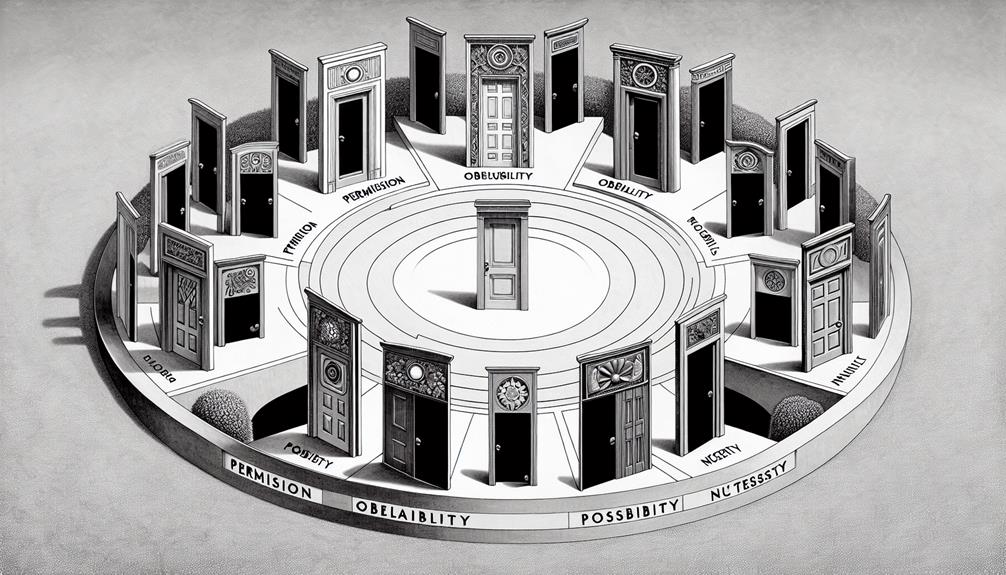Modals are like the special sauces of language; they spice up my sentences and express things like possibility, ability, and necessity. There's quite a few of them, each with its own flavor. "Can" and "could," for instance, help me talk about what I'm capable of or what might be possible. "May" and "might" are all about possibilities too, but they're also handy when I need to ask for permission politely. Then there's "must" and "should," which I use whenever I need to sound more certain or give some advice. Exploring further, you'll see how these little helpers make a big impact!
Table of Contents
Key Takeaways
- Modal verbs modify other verbs to express possibility, ability, necessity, or other conditions.
- Common modal verbs include 'can,' 'could,' 'may,' 'might,' 'must,' 'shall,' 'should,' 'will,' and 'would.'
- 'Can' and 'could' are used to express ability and possibility.
- 'Must,' 'shall,' and 'should' indicate obligation or advice, varying in the degree of necessity.
- 'May' and 'might' generally deal with permission and likelihood of events.
Understanding Modal Verbs
Let's dive into what modal verbs are and why they're super important in English. Modal verbs, like can, could, may, might, and must, are a unique bunch in the grammar world. They don't just act alone; they team up with other verbs to add a flavor of possibility, ability, or necessity to what you're saying. They're like the seasoning that can completely change how a sentence tastes.
Understanding modal verbs is key to expressing yourself clearly and powerfully. Think about it: if you can master using ‘can' to show ability, ‘may' to ask for permission, or ‘must' to express an obligation, you're not just following rules. You're playing with the language to make it work for you. It's about getting your point across with the right degree of force or politeness.
Each modal verb serves its purpose and has its place in a sentence, helping you to convey just what you mean. Getting them right is essential because they affect the tone and clarity of your messages. Whether you're asking for a favor, giving advice, or laying down the law, modal verbs are your go-to tools. Master them, and you're on your way to becoming a fluent and effective communicator.
Core Functions of Modals
Let's kick off by defining what modals are really all about. They're not just fancy grammar; they're the key to expressing what we can or must do, what we might do, and even asking for permission.
Knowing how to use them correctly, like when to say 'can' instead of 'could', really makes our language clear and effective.
Defining Modal Purposes
Modal verbs like 'can,' 'must,' and 'should' play key roles in expressing abilities, possibilities, obligations, and necessities. When I've mastered these verbs, I can make my language much more nuanced and precise. Here's why they're so crucial:
- Empowerment: I can show what I'm capable of or what's achievable.
- Freedom: They let me explore what might be, opening up a world of possibilities.
- Responsibility: They help me express what needs to be done, whether it's a personal duty or a strict requirement.
- Certainty: I can state what's necessary or unavoidable with conviction.
- Guidance: They offer a way to advise or recommend actions to others, gently guiding their choices.
Mastering these modals really fine-tunes how I communicate!
Common Modal Varieties
I'll now dive into the common modal varieties such as 'can,' 'could,' 'may,' 'might,' 'must,' and 'should,' each serving distinct core functions in our language.
'Can' and 'could' are all about what's possible or what someone's able to do. For instance, I can swim implies ability, whereas I could go implies a potential choice.
'May' and 'might' deal with possibilities too, but they're more about what might happen in the future or seeking permission, like you might win the game or may I leave early?
Finally, 'must' and 'should' talk about necessity and advice. Must indicates something more compulsory, like you must stop here, while should is gentler, like you should try this pie—it's great!
Modal verbs really shape how we express ourselves.
Expressing Ability
When discussing how to express ability, we often turn to modal verbs like can and could. These simple words are powerful tools in showing what someone is capable of doing or what they could potentially do. It's fascinating how just a couple of words can convey so much about a person's skills or talents.
Modal verbs for expressing ability are pretty straightforward:
- 'Can' shows current skills or abilities. For example, saying, 'I can solve complex math problems,' highlights an existing skill.
- 'Could' is used to talk about past abilities or potential future ones. For instance, 'Could you play the piano when you were six?' asks about a past capability.
- Using these modals can evoke pride when sharing accomplishments: 'She can speak three languages fluently.'
- They also stir curiosity about past or untapped abilities: 'Could you swim when you were younger?'
- And importantly, they help us express admiration for others' talents and imagine potential growth in ourselves and others.
Understanding and using these modals effectively lets you not only talk about factual abilities but also connect emotionally by highlighting potential and past achievements.
Granting Permission
After exploring how modals express ability, let's look at how they're used to grant permission, focusing on 'can' and 'may'. These two modals are super handy when you want to ask permission or give someone the green light to do something.
So, 'can' is the go-to modal for everyday situations. It's laid-back and you'll hear it all the time. For instance, if you're chilling with a friend and need to grab a soda from their fridge, you'd typically say, 'Can I grab a soda?' It's straightforward and casual.
On the other hand, 'may' steps up the formality. It's like putting on a nice shirt for a special occasion. You use 'may' when you want to be extra polite or in more formal settings. Picture yourself at a fancy dinner and you ask, 'May I use the restroom?' It just sounds more polished.
Both 'can' and 'may' let someone do something, but choosing which to use can really shape how you come across. Knowing when to use each can help you nail the right tone, whether you're asking for permission or giving it. This isn't just about following rules—it's about communicating smartly and effectively.
Indicating Likelihood
Modal verbs like 'will', 'might', and 'may' are key players when it comes to expressing how likely something is to happen. When I'm chatting or writing, these modal verbs are super handy to suggest that something could occur, without saying it definitely will. They're like the cautious friends in the grammar world, always weighing the odds.
Here's how they stir emotions and add flavor to our conversations:
- *It might rain tomorrow.* – Keeps you guessing, doesn't it? Better carry an umbrella, just in case.
- *She may win the competition.* – Injects a dose of hope, making you root for her.
- *They could arrive late.* – Adds a hint of uncertainty, so you might wait a bit longer before starting the dinner.
- *I will probably finish the project by tonight.* – Offers a promise, yet leaves a little wiggle room.
- *You can possibly ace this exam.* – Encourages, but also acknowledges the challenge ahead.
Grasping these modal verbs helps me express possibilities with just the right touch of emotion, whether it's optimism, caution, or simple realism. They're essential for anyone wanting to master effective communication, making sure every shade of likelihood is beautifully conveyed.
Imposing Obligation
When we talk about imposing obligation with modals, we're really getting into the nitty-gritty of necessity and authority.
For instance, rules aren't just suggestions; they're often framed as necessities using 'must' or 'have to' to show they're not optional.
These verbs also pop up a lot in legal settings, where the law dictates what we can and can't do.
Necessity of Rules
We often use modal verbs like 'must' and 'have to' to clearly express the need to follow certain rules or obligations. These modal verbs are crucial in our daily communication, especially when it comes to emphasizing the necessity of certain actions.
Here's why these modal verbs tug at our heartstrings:
- Safety: 'You must wear a helmet' isn't just a rule; it's about protecting your noggin!
- Health: 'You have to eat veggies' means staying vibrant and healthy.
- Fairness: 'Everyone must follow the rules' ensures all play by the same book.
- Success: 'You have to practice'—because effort breeds achievement.
- Responsibility: 'You must pay your debts'—it's about honoring commitments.
Mastering these expressions helps us not just abide but thrive in various aspects of life.
Authority and Commands
In giving orders, I often rely on modal verbs like 'must' and 'have to' to lay down the law clearly and firmly. These modal verbs are my go-to tools when I need to express authority or impose commands that aren't up for debate. They make my expectations clear—there's no ambiguity about what needs to be done.
Here's a simple table to show how I use these modals in different contexts:
| Modal Verb | Usage | Example |
|---|---|---|
| Must | Strong obligation | You must finish this. |
| Have to | External obligation | We have to wear IDs. |
| Should | Recommended action | You should listen. |
Understanding and using these modal verbs correctly ensures that I'm not just heard, but obeyed.
Legal Requirements Obligations
Navigating legal requirements means I've got to stick to specific rules to avoid trouble. In my experience, understanding the verbs that dictate these obligations is key. For instance, terms like 'must,' 'shall,' and 'are required to' aren't just fancy words; they're legal bindings that I can't ignore without risking serious consequences.
Here's why sticking to these verbs matters:
- Avoiding Fines: Nobody wants to lose money over overlooked details.
- Preventing Lawsuits: Legal battles are exhausting and expensive.
- Maintaining Reputation: My credibility is on the line with every obligation.
- Staying Operational: Meeting regulations keeps my business running smoothly.
- Peace of Mind: Knowing I'm compliant lets me sleep better at night.
Mastering these legalities isn't just smart; it's essential.
Offering Advice
Offering advice often involves using the modal verb 'should' to suggest better choices. When I say, 'You should study more for your exam,' I'm not just throwing words around. I'm actually nudging you towards a course of action that could really benefit you. The modal 'should' is super handy because it's a polite way of giving advice without coming off as too pushy or bossy.
Now, why do we use 'should' so much in giving advice? It's because it hits a sweet spot between sounding authoritative and considerate. It suggests that there's a good reason behind the recommendation, which helps the person receiving the advice see the logic in it. This is crucial when you want someone to listen and consider your suggestion seriously.
Using 'should' also softens the blow a bit. It's like saying, “Here's what would be best,” instead of “You must do this.” It leaves room for the other person to think and decide for themselves, which is much nicer than ordering them around.
Modal Verbs in Requests
When making requests, it's common to use modal verbs like 'can,' 'could,' and 'may' to keep things polite and respectful. I've found that these modal verbs are super handy in making sure I don't come off as too demanding or rude, especially in situations where I need a favor or some help.
Using these modals, I can adjust the tone of my requests to suit the relationship and the context. Here's why I think they're so important:
- Respect: Saying 'Could you please…' shows I respect the other person's choice to help me or not.
- Softening: 'Can you help me out?' sounds much less direct than 'Help me out.'
- Formality: Using 'May I ask for…' in professional settings keeps things appropriately formal.
- Flexibility: 'Would you mind if…' allows the other person some wiggle room to say no.
- Consideration: It shows I'm considerate of the other person's time and effort.
All in all, modal verbs help me ensure that my requests convey politeness, respect, and consideration, making it easier for others to respond positively. They're a key part of how I communicate effectively and maintain good relationships.
Suggestions Using Modals
Let's kick off this section by tackling the key points about using modals for suggestions.
First up, we'll cover the basics of modal functions, then highlight some common mistakes people make.
Modal Functions Overview
Modal verbs like should, could, and might are great for giving suggestions without coming off too strong. When I'm trying to sound helpful without being pushy, these modal verbs are my go-to tools. They let me offer advice and propose ideas while keeping the tone light and respectful. Here's why they're so handy:
- *Flexibility*: They fit almost any situation.
- *Politeness*: They make requests sound less direct.
- *Openness*: They suggest options, not demands.
- *Subtlety*: They introduce ideas gently.
- *Encouragement*: They invite others to consider new possibilities.
Using modal verbs effectively means you're thoughtful about how your words might be received. It's all about making the right impact without overstepping.
Common Modal Mistakes
I've noticed a bunch of common slip-ups when folks use modals to make suggestions. A big one is using 'can' instead of 'could' when talking about past abilities. It's like saying, 'I can swim' when you mean 'I could swim back then.'
Also, folks often mix up 'may' and 'might'. 'May' suggests a stronger possibility than 'might', but both get jumbled up all the time.
Another goof? Using 'should' when 'must' is needed for strong obligations. And don't get me started on using 'can' for permissions when 'may' sounds way more polite.
Lastly, not using 'could' for polite requests is another overlooked detail. These mix-ups can really twist up your meaning!
Tips for Effective Usage
To give great advice, you can use modal verbs like 'should,' 'must,' and 'can' to make your suggestions clear and polite. Here's how I make the most out of these handy tools:
- Use 'should' to suggest: It softens the advice, making it feel less like a command. 'You should try it!'
- 'Must' for urgency: When it's critical, I say, 'You must see this!'
- 'Can' for possibilities: It opens up options. 'You can join us if you like.'
- Mix them up: Depending on the situation, I switch between modals to keep my language vibrant and engaging.
- Practice makes perfect: The more I use them, the more natural they feel in my conversations.
Commands With Modals
We often use modals like should, must, and can when we need to give someone a clear instruction or suggestion. These modal verbs are super handy in everyday communication, especially when you're trying to get your point across with some authority but without coming off too strong.
Let's break it down a bit. When you use 'should', it's like you're giving friendly advice. For example, saying 'You should check out that new cafe,' doesn't sound too pushy. Then there's 'must', which cranks up the necessity of the action. If I say, 'You must submit this by tomorrow,' I'm making it clear that it's really important and there's a deadline involved. Lastly, 'can' is all about giving permission or showing possibility, like 'You can take a break now.'
When you toss these modals into commands, always remember to follow them with the base form of the verb. This keeps your instructions crisp and easy to understand. For instance, 'You must complete the form,' or 'You should listen carefully.'
Using these modals correctly can make a huge difference in how your message is received, ensuring you're clear and effective in what you're trying to convey.
Habitual Actions and Modals
While we've seen how modals like 'should' and 'must' are used in commands, they're also great for talking about our daily routines and habits. When I think about how these words fit into my life, it's clear they do more than just order us around—they shape our world through the habits we keep.
Here's how these little verbs make a big impact:
- Connectivity: 'I should call my mom every Sunday.' It's not just a plan; it feels like a bridge that keeps us connected.
- Self-care: When I say, 'I must meditate each morning,' it's a promise to myself to maintain mental clarity and peace.
- Learning: Telling myself, 'I should read nightly,' isn't just about habit—it's about feeding my mind and growing.
- Health: 'I must drink water throughout the day.' This simple modal nudges me towards healthier living.
- Discipline: 'I should review my tasks each morning.' It's not just routine; it's a ritual that sets the tone for productive days.
Understanding these modals isn't just about grammar—it's about crafting the rhythms that define our lives. They're not just words; they're tools for building consistent, purposeful habits.
Practical Examples of Usage
Let's dive into some real-life examples of how modal verbs pop up in everyday conversations and written communication. Imagine you're asking for permission to leave work early. You'd likely say, 'May I leave early today?' Here, 'may' expresses possibility and polite permission. Now, if you're more certain about the go-ahead, you might say, 'Can I leave early today?' where 'can' shows you believe it's possible and acceptable.
Suppose your friend is unsure about attending a party. You might advise, 'You should go; it'll be fun!' Here, 'should' suggests a recommendation. Now, if it turns into an obligation, like a family event, you'd say, 'You must go; it's your cousin's wedding!' 'Must' here shows necessity or obligation.
In academic writing, modal verbs help soften claims to sound more cautious or scholarly. Instead of writing, 'This theory is wrong,' you'd write, 'This theory might be incorrect,' where 'might' introduces uncertainty.
Understanding these practical examples of usage can significantly boost how you use modal verbs. They're not just grammatical must-haves; they shape how we express attitudes and handle social interactions. So, mastering their use is crucial for effective communication.
Frequently Asked Questions
What Is Modals and Its Types With Example?
I'm exploring how modal verbs like can, could, and must express necessity or possibility. For instance, "I can swim" shows ability, while "You must study" indicates a requirement. They're crucial for clear communication.
What Are the 4 Types of Modal Verbs?
I've learned that the four types of modal verbs are ability, permission, likelihood, and obligation. They help express what we can, may, might, must, or have to do in various situations.
How Do You Explain Modal?
I'd explain a modal as an auxiliary verb that helps express necessity, possibility, or permission. Examples include 'can,' 'must,' and 'may.' They're key for showing different moods or attitudes in our sentences.
What Are Modals 5 Examples?
I'll give you five examples of modals: can, could, may, might, and must. Each one helps express different ideas like ability, possibility, permission, or necessity in a sentence, making communication clearer and more precise.
- Why Do We Need to Study Modals? - April 21, 2024
- Why Is It Important to Learn Modals? - April 21, 2024
- How Do You Use Modals Examples? - April 21, 2024








